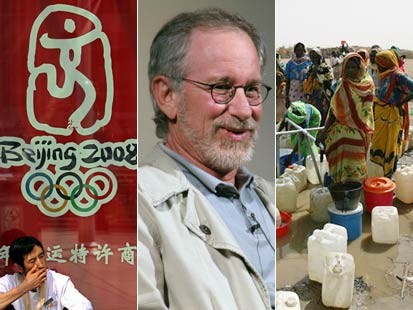Second, France's president Sarkozy elaborated in a speech in SA on his proposed change in France's African policy. France no longer wants to "be the gendarme of Africa". Notable is the introduction of a principle of transparency in French relations with African countries, which apparently also means a hitherto unknown democratization of France's foreign policy with regard to Africa (in bold):
Et je veux devant le Parlement d’Afrique du Sud faire quatre propositions. La première porte sur les accords de défense entre la France et les pays africains. Ils doivent refléter l’Afrique d’aujourd’hui, et non pas l’Afrique d’hier. Ils doivent reposer sur les intérêts stratégiques de la France et de ses partenaires africains. Je ne dis pas qu’il faille nécessairement faire tablerase et tout effacer d’un seul trait de plume. Mais je dis que la France souhaite engager des discussions avec tous les Etats africains concernés pour adapter les accords existants aux réalités du temps présent et en tenant le plus grand compte de la propre volonté des pays africains. La France sera ouverte au dialogue avec tous ceux qui souhaiteront nouer avec elle un nouveau partenariat en matière de sécurité.
Deuxième proposition, je vais refonder nos relations sur un principe qui n’existait pas et que j’imposerai, le principe de la transparence. La transparence, c’est la meilleure garantie pour des relations solides et durables, le meilleur antidote aux fantasmes et aux incompréhensions. Contrairement à la pratique passée, j’annonce au Parlement d’Afrique du Sud que tous les accords de défense entre la France et les pays africains seront intégralement publiés. J’associerai également étroitement le Parlement français aux grandes orientations de la politique de la France en Afrique.
Troisièmement, je propose que la présence militaire française en Afrique serve en priorité à aider l’Afrique à bâtir, comme elle en a l’ambition, son propre dispositif de sécurité collective. L’Union africaine souhaite disposer de forces en attente à l’horizon 2010 – 2012 ? Eh bien que cet objectif soit aussi celui de la France ! La France n’a pas vocation à maintenir indéfiniment des forces armées en Afrique, l’Afrique doit prendre en charge ses problèmes de sécurité. Que l’on me comprenne bien : il ne s’agit nullement d’un désengagement de la France en Afrique. C’est tout le contraire. Je souhaite que la France s’engage davantage au côté de l’Union Africaine, cher Thabo, pour construire le système de sécurité collective dont l’Afrique a besoin car la sécurité de l’Afrique c’est d’abord naturellement l’affaire des Africains.
Enfin, ma dernière proposition vise à faire de l’Europe un partenaire majeur de l’Afrique en matière de paix et de sécurité. C’est le sens du partenariat conclu entre nos deux continents à Lisbonne en décembre dernier. C’est notre intérêt à tous, car une Europe forte a besoin d’une Afrique forte. Mais je sais bien que le meilleur garant de la paix et de la sécurité, c’est la démocratie et la justice. Alors parlons-en de démocratie et de justice. La France souhaite en en Côte d’Ivoire la tenue d’élections libres, justes et reconnues. Aucun pays ne peut espérer le développement sans organiser des élections démocratiques.

